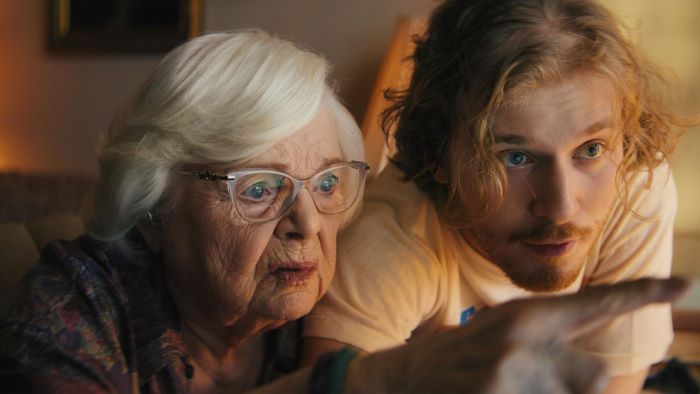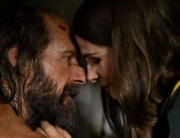Kinetic and continuously funny, Josh Margolin’s Thelma is a silly revenge thriller, a hoot with a heart. June Squibb plays the titular role, a crocheting 93-year-old widow living a quiet life alone in her small Los Angeles–area home. Her grandson, Daniel (Fred Hechinger), is a sweet, but directionless manchild, inhibited in part by his overprotective parents (Parker Posey and Clark Gregg). He helps Thelma around the house, especially with computers and tech.
However, while Daniel is away, Thelma becomes a victim of a phone scam when a perpetrator calls pretending to be Daniel, asking for bail money cash in the wake of a car accident. (My own grandmother experienced a similar scam. Thankfully, she didn’t give away money, but it rattled her emotionally.) Thelma mails $10,000 in cash to the thieves’ P.O. box, but is sad and peeved to learn through her family that she has been swindled. With gumption, stubbornness, and a little inspiration from Tom Cruise in Mission: Impossible, she ventures out into the city to get her money back. She gets a motorized scooter and (reluctant, at first) help from an old friend, Ben (Richard Roundtree), who escapes out of his retirement home to aid her. (He just has to make it back by eight o’clock for his Daddy Warbucks role in the home’s production of Annie.)
Plot-wise, the film sounds a bit like potential Stop! Or My Mom Will Shoot dribble, but Margolin, drawing upon his own grandmother’s experiences and personality, has created a nimble, heartwarming picture. It pokes some harmless fun at Thelma, but many of us can relate to her confusion of where to click out of a pop-up ad. (Most of us too are probably more on Squibb’s level of combatting criminals, rather than Tom Cruise’s.) The film also gives her tremendous agency and respect: She doesn’t want to be bogged down by her worrying family.
The San Fernando Valley setting is simultaneously depressing to behold—with its florescent-lit P.O. box spots and gritty alleys—and pleasing, with its palm trees and rosy sunlight. Visually, the rollicking low-stakes action sequences harken back to shiny fish-out-of-water comedies of the 1980s such as Beverly Hills Cop.
Squibb, a character actress who gained attention from her scene-stealing Oscar-nominated role in Alexander Payne’s Nebraska, is equally brilliant here. Every single one of her lines lands vibrantly with a mix of wide-eyed incomprehension and mercurial plotting, and through the tenor of her voice and physicality. It’s such a vivid comedic turn that it seems difficult for some others, even an actor as sharp as Posey, to keep up.
If there’s one quibble with the film, it’s Posey and Gregg as Hechinger’s helicopter parents. Here the comedy sometimes falls a little flat: Posey seems to be a new age therapist type while simultaneously high strung. Gregg doesn’t register much as a character at all. Roundtree, however, shines. Perhaps because it’s his final role, there’s a sense of winsome sentimentality when he’s onscreen that is hard to shake. His presence is very moving as the warm, but prickly sidekick to Thelma. Ben is also a fitting echo of Shaft—the cool sleuth from the 1971 film. Another great elder character actor turn comes from Bunny Levine as shut-in Mona, from whom Thelma amusingly attempts to steal a gun.
I caught the film at the Provincetown International Film Festival, where the audience howled and clapped at many of the movie’s jokes and visual gags. It stood out amongst the fest’s modest dramas, ultimately winning the Audience Award for Best Narrative Feature.

















Leave A Comment